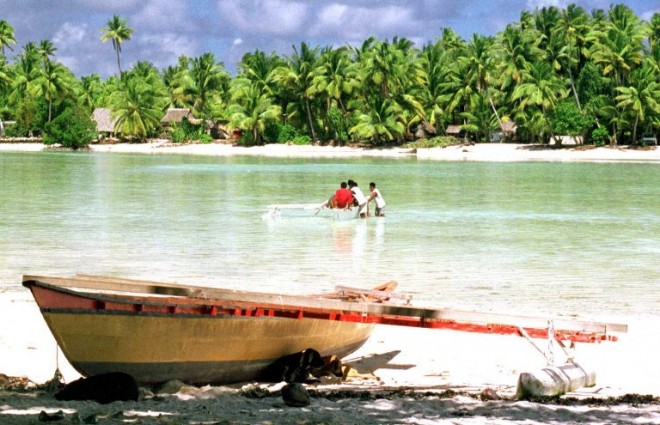Amid rising sea levels, Kiribati hopes to remain an island nation
BALI, Indonesia – Amid rising waters threatening to banish Kiribati, its president and residents are living in hope that they would remain as an island nation in the Pacific.
“We don’t want to go. We’re going to be able to stay in our islands. That is our best option.”
This was stressed by Kiribati President Anote Tong in a press conference after he delivered a strongly-worded speech anchored on climate change before the delegates of International Fund for Agricultural Development (IFAD) Asia-Pacific workshop held on this island.
Rising waters elsewhere in the world brought about by climate change are threatening to wash away Kiribati (pronounced Kee-ree-bahs), one of the poorest nations in the world situated in the central tropical Pacific Ocean.
Situated in low-lying islands, Kiribati has a total land area of 800 square kilometers consisting of 32 atolls and a raised coral island dispersed over 3.5 million square kilometers of ocean. It has a population of about 100,000.
Article continues after this advertisementBut President Tong said that they will have to migrate as a nation if the situation worsens.
Article continues after this advertisementHe revealed that some countries offered to accommodate them should they decide to abandon their sinking islands and start their lives anew.
Tong, who recently participated in the Climate-Induced Migration High Level Forum by the Coalition of Atoll Nations on Climate Change, acknowledged that purchasing land and migrating was one of the cheapest measures they were considering.
“Another adaptation measure beyond our territory is the purchase of land in Fiji. This will be our investment for food security and future relocation in the event of a worst case scenario,” Tong said.
“We commend the Government of Fiji – the first in the world to publicly welcome us when our country becomes uninhabitable.”
Tong also said that the former president of East Timor has repeatedly expressed willingness to accommodate the people of Kiribati in their country.
Kiribati is just one of the island countries experiencing the drastic effects of rapid changes in weather conditions. The unstable climate condition is a threat to their survival and economic growth.
The vast ocean with all of its richness is Kiribati’s main source of livelihood. The country heavily relies on revenue from fishing licenses handed to companies who tap the country’s marine resources.
“Yet, this very same ocean is now threatening our very survival. My people, living on low-lying atoll islands no higher than three meters above the sea, are facing unprecedented challenges. Kiribati, Tuvalu, Tokelau, the Republic of the Marshall Islands and others — we are on the frontline of this major calamity,” he said.
Tong’s statement came a month before of the United Nations (UN) Convention on Climate Change or the COP 21 in Paris, France.
A firm climate change advocate, Tong urged world leaders to stop quibbling and start acting on the world’s worsening climate before his country sinks.
‘Migrate with dignity’
Despite being welcomed by states to freely migrate in their countries, Tong stressed that migration is their last option.
But if they really have to leave, Kiribati’s chief executive wanted his people to “migrate with dignity.”
Further asked about the possibility of relocation, Tong narrated a story of the world’s would-be first “climate change refugee.”
In 2007, Ioane Teitiota travelled to New Zealand and overstayed to seek refuge from the potent dangers of climate change in his home country.
While recognizing that Teitiota was facing serious challenges back home, the government of New Zealand deported him, citing lack of evidence that “the government of Kiribati is failing to take steps to protect its citizens from the effects of environmental degradation to the extent that it can.”
But Teitiota was offered to relocate in East Timor and all expenses will be covered by its president, according to Tong.
Tong admitted that such offers were attractive to his citizens but pointed out that his people must have dignity left with them should they decide to leave their country.
“I’ve been asked a number of questions. Why don’t you come? Our position is different. We always have advocated the policy of migration with dignity rather than climate refugees,” Tong said.
“We’re going to advocate a policy that is mutually beneficial to all parties. So what we are doing is training our people. Training our people, preparing them to be able to migrate as skilled people, people will move with dignity.”
Hopes for COP 21
A month before the COP 21, Tong, speaking before some 300 agriculture and development experts in the region, posed a challenge to world leaders.
“I had consistently called on the international community, that to achieve an effective response to climate change, sacrifices had to be made and this was our response, our statement our challenge to the global community that it can be done,” Tong said.
He explained the tough decision his government had to make when it declared a large part of its fishing area as a protected marine protected area, urging other countries to commit on doing its part to mitigate the effects of climate change.
“Climate change will be the most challenging test of our human ingenuity and our human values,” he said.
“We look forward to Paris and the conclusion of a legally binding agreement with targets that will help reduce global warming and leave no one behind.”
